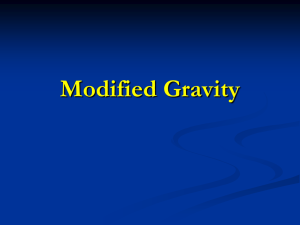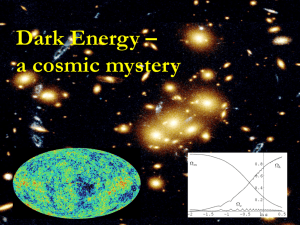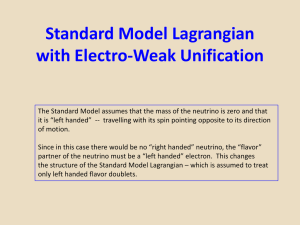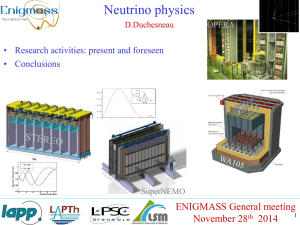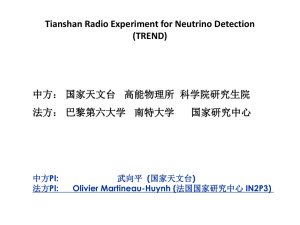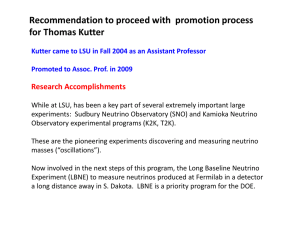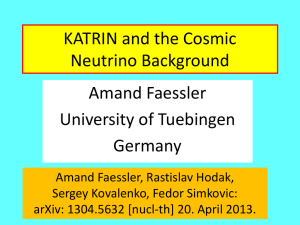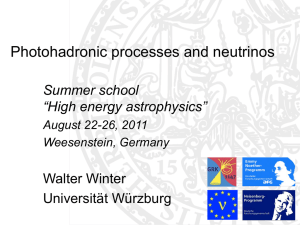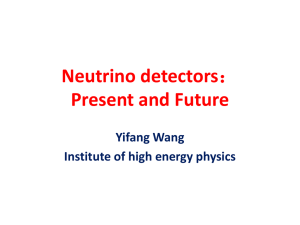Neutrino mass
advertisement
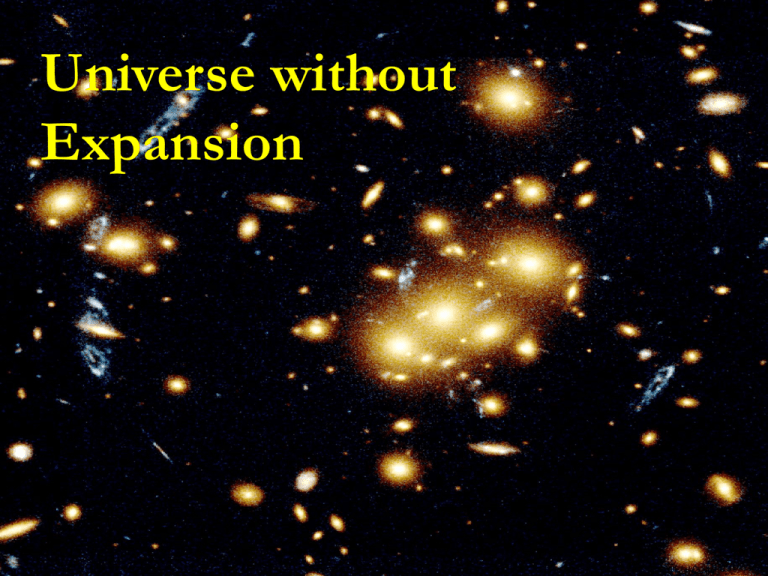
Universe without Expansion The Universe is shrinking The Universe is shrinking … while Planck mass and particle masses are increasing Two models of “ Variable Gravity Universe “ Scalar field coupled to gravity Effective Planck mass depends on scalar field Simple scalar potential : quadratic ( model A ) cosmological constant ( model B ) Nucleon and electron mass proportional to Planck mass Neutrino mass has different dependence on scalar field Model A Inflation Radiation Matter Dark Energy : : : : Universe expands Universe shrinks Universe shrinks Universe expands Model B Inflation Radiation Matter Dark Energy : : : : Universe expands Static Minkowski space Universe expands Universe expands Compatibility with observations Both models lead to same predictions for radiation, matter , and Dark Energy domination, despite the very different expansion history Different inflation models: A: n=0.97, r=0.13 B: n=0.95, r=0.04 Almost same prediction for radiation, matter, and Dark Energy domination as ΛCDM Presence of small fraction of Early Dark Energy Large neutrino lumps Cosmon inflation Unified picture of inflation and dynamical dark energy Cosmon and inflaton are the same field Quintessence Dynamical dark energy , generated by scalar field (cosmon) C.Wetterich,Nucl.Phys.B302(1988)668, 24.9.87 P.J.E.Peebles,B.Ratra,ApJ.Lett.325(1988)L17, 20.10.87 Prediction : homogeneous dark energy influences recent cosmology - of same order as dark matter Original models do not fit the present observations …. modifications Merits of variable gravity models Economical setting No big bang singularity Arrow of time Simple initial conditions for inflation Model A μ= 2 10-33 eV Scalar field equation: additional force from R counteracts potential gradient : increasing χ ! Modified Einstein equation New term with derivatives of scalar field Curvature scalar and Hubble parameter Scaling solutions ( for constant K ) Four different scaling solutions for inflation, radiation domination, matter domination and Dark Energy domination Scalar dominated epoch, inflation Universe expands for K > 4, shrinks for K < 4. No big bang singularity Radiation domination Universe shrinks ! scaling of particle masses mass of electron or nucleon is proportional to variable Planck mass χ ! effective potential for Higgs doublet h cosmon coupling to matter qχ=-(ρ-3p)/χ Matter domination Universe shrinks ! Dark Energy domination neutrino masses scale differently from electron mass new scaling solution. not yet reached. at present : transition period Model B Radiation domination Flat static Minkowski space ! H=0 ! exact regular solution ! (constant K ) constant energy density Matter domination Weyl scaling Kinetial scalar σ with standard normalization Inflation : Slow roll parameters End of inflation at ε = 1 Number of e-foldings before end of inflation ε, η, N can all be computed from kinetial alone Spectral index and tensor to scalar ratio Model A Amplitude of density fluctuations Einstein frame , model B 2 k for large χ : no difference to model A inflation model B approximate relation between r and n n=0.95 , r=0.035 conclusion 1 cosmon inflation : compatible with observation simple no big bang singularity stability of solution singles out arrow of time simple initial conditions Growing neutrino quintessence Observational bounds on Ωh G.Robbers , M.Doran ,… Why now problem Why does fraction in Dark Energy increase in present cosmological epoch , and not much earlier or much later ? Why neutrinos may play a role Mass scales : Dark Energy density : ρ ~ ( 2×10 -3 eV )- 4. Neutrino mass : eV or below. Cosmological trigger : Neutrinos became nonrelativistic only in the late Universe . Neutrino energy density not much smaller than Dark Energy density . Neutrinos can have substantial coupling to Dark Energy. connection between dark energy and neutrino properties = 1.27 present dark energy density given by neutrino mass present equation of state given by neutrino mass ! Neutrinos in cosmology only small fraction of energy density only sub-leading role ? Neutrino cosmon coupling Strong bounds on atom-cosmon coupling from tests of equivalence principle or time variation of couplings. No such bounds for neutrino-cosmon coupling. In particle physics : Mass generation mechanism for neutrinos differs from charged fermions. Seesaw mechanism involves heavy particles whose mass may depend on the value of the cosmon field. neutrino mass seesaw and cascade mechanism triplet expectation value ~ doublet squared omit generation structure M.Magg, C.W. 1980 Neutrino cosmon coupling realized by dependence of neutrino mass on value of cosmon field β ≈ 1 : cosmon mediated attractive force between neutrinos has similar strength as gravity growing neutrinos change cosmon evolution modification of conservation equation for neutrinos growing neutrino mass triggers transition to almost static dark energy growing neutrino mass L.Amendola, M.Baldi,… effective cosmological trigger for stop of cosmon evolution : neutrinos get non-relativistic this has happened recently ! sets scales for dark energy ! connection between dark energy and neutrino properties = 1.27 present dark energy density given by neutrino mass present equation of state given by neutrino mass ! cosmological selection present value of dark energy density set by cosmological event : neutrinos become non – relativistic not given by ground state properties ! basic ingredient : cosmon coupling to neutrinos Cosmon coupling to neutrinos can be large ! Fardon,Nelson,Weiner interesting effects for cosmology if neutrino mass is growing growing neutrinos can stop the evolution of the cosmon transition from early scaling solution to cosmological constant dominated cosmology L.Amendola,M.Baldi,… stopped scalar field mimicks a cosmological constant ( almost …) rough approximation for dark energy : before redshift 5-6 : scaling ( dynamical ) after redshift 5-6 : almost static ( cosmological constant ) cosmon evolution “stopped” scaling neutrino lumps neutrino fluctuations neutrino structures become nonlinear at z~1 for supercluster scales D.Mota , G.Robbers , V.Pettorino , … stable neutrino-cosmon lumps exist N.Brouzakis , N.Tetradis ,… ; O.Bertolami ; Y.Ayaita , M.Weber,… Formation of neutrino lumps N- body simulation M.Baldi et al N-body code with fully relativistic neutrinos and backreaction one has to resolve local value of cosmon field and then form cosmological average; similar for neutrino density, dark matter and gravitational field Y.Ayaita,M.Weber,… Formation of neutrino lumps Y.Ayaita,M.Weber,… backreaction cosmon field inside lumps does not follow cosmological evolution neutrino mass inside lumps smaller than in environment L.Schrempp, N.Nunes,… importance of backreaction : cosmological average of neutrino mass Y.Ayaita , E.Puchwein,… importance of backreaction : fraction in Dark Energy neutrino lumps behave as non-relativistic fluid with effective coupling to cosmon Y.Ayaita, M.Weber,… φ - dependent neutrino – cosmon coupling neutrino lumps form and are disrupted by oscillations in neutrino mass smaller backreaction oscillating neutrino mass oscillating neutrino lumps small oscillations in dark energy conclusions Variable gravity cosmologies can give a simple and realistic description of Universe Compatible with tests of equivalence principle and bounds on variation of fundamental couplings if nucleon and electron masses are proportional to variable Planck mass Different cosmon dependence of neutrino mass can explain why Universe makes a transition to Dark Energy domination now characteristic signal : neutrino lumps Tests for growing neutrino quintessence Hubble parameter as compared to ΛCDM Hubble parameter ( z < zc ) only small difference from ΛCDM ! bounds on average neutrino mass Small induced enhancement of dark matter power spectrum at large scales Enhanced bulk velocities Enhancement of gravitational potential Test of allowed parameter space by ISW effect Can time evolution of neutrino mass be observed ? Experimental determination of neutrino mass may turn out higher than cosmological upper bound in model with constant neutrino mass ( KATRIN, neutrino-less double beta decay ) GERDA Conclusions Cosmic event triggers qualitative change in evolution of cosmon Cosmon stops changing after neutrinos become non-relativistic Explains why now Cosmological selection Model can be distinguished from cosmological constant End strong effective neutrino – cosmon coupling for φ → φt typical present value : β ≈ 50 cosmon mediated attraction between neutrinos is about 502 stronger than gravitational attraction early scaling solution ( tracker solution ) neutrino mass unimportant in early cosmology dark energy fraction determined by neutrino mass constant neutrino - cosmon coupling β variable neutrino - cosmon coupling effective stop of cosmon evolution cosmon evolution almost stops once neutrinos get non –relativistic ß gets large This always happens for φ → φt ! A few early references on quintessence C.Wetterich , Nucl.Phys.B302,668(1988) , received 24.9.1987 P.J.E.Peebles,B.Ratra , Astrophys.J.Lett.325,L17(1988) , received 20.10.1987 B.Ratra,P.J.E.Peebles , Phys.Rev.D37,3406(1988) , received 16.2.1988 J.Frieman,C.T.Hill,A.Stebbins,I.Waga , Phys.Rev.Lett.75,2077(1995) P.Ferreira, M.Joyce , Phys.Rev.Lett.79,4740(1997) C.Wetterich , Astron.Astrophys.301,321(1995) P.Viana, A.Liddle , Phys.Rev.D57,674(1998) E.Copeland,A.Liddle,D.Wands , Phys.Rev.D57,4686(1998) R.Caldwell,R.Dave,P.Steinhardt , Phys.Rev.Lett.80,1582(1998) P.Steinhardt,L.Wang,I.Zlatev , Phys.Rev.Lett.82,896(1999)
